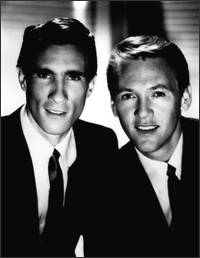

Among the first to capitalize on what became
known as blue-eyed soul, The Righteous Brothers achieved their
greatest success in the mid-60s under producer Phil Spector.
They weren't brothers, but Bill Medley and Bobby Hatfield (both born in 1941) were most definitely righteous, defining (and perhaps even inspiring) the term "blue-eyed soul" in the mid-'60s. The White, Southern California duo were an established journeyman doo wop/R&B act before an association with Phil Spector produced one of the most memorable hits of the 1960s, "You've Lost That Lovin' Feelin'." The collaboration soon fell apart, though, and while the singers had some other excellent hit singles in a similar style, they proved unable to sustain their momentum after just a year or two at the top.
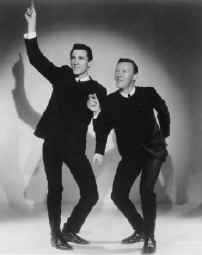
When Medley and Hatfield combined forces in 1962, they emerged from regional groups the Paramours and the Variations; in fact, they kept the Paramours billing for their first single. By 1963, they were calling themselves the Righteous Brothers, Medley taking the low parts with his smoky baritone, Hatfield taking the higher tenor and falsetto lines. For the next couple of years they did quite a few energetic R&B tunes on the Moonglow label that bore similarity to the gospel/soul/rock style of Ray Charles, copping their greatest success with "Little Latin Lupe Lu," which became a garage band favorite covered by Mitch Ryder, the Kingsmen, and others.
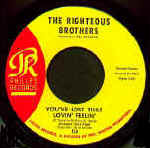
Even on the Moonglow recordings, Bill Medley
acted as producer and principal songwriter, but the duo wouldn't
break out nationally until they put themselves at the services of
Phil Spector. Spector gave the wall-of-sound treatment to
"You've Lost That Lovin' Feelin'," a grandiose ballad
penned by himself, Barry Mann, and Cynthia Weil. At nearly four
minutes, the song was pushing the limits of what could be played
on radio in the mid-'60s, and some listeners thought they were
hearing a 45
single played at 33 rpm due to Medley's low, blurry lead vocal.
No matter; the song had a power that couldn't be denied, and went
all the way to number one.
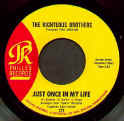
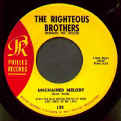
The Righteous Brothers had three more big hits in
1965 on Spector's Philles label ("Just Once in My
Life," "Unchained Melody," and "Ebb
Tide"), all employing similar dense orchestral arrangements
and swelling vocal crescendos. Yet the Righteous Brothers-Spector
partnership wasn't a smooth one, and by 1966 the duo had left
Philles for a lucrative deal with Verve. Medley, already an
experienced hand in the producer's booth, reclaimed the
producer's chair, and the Righteous
Brothers had another number one hit with their first Verve
outing, "(You're My) Soul and Inspiration." Its success
must have been a particularly bitter blow for Spector, given that
Medley successfully emulated the wall-of-sound orchestral
ambience of the Righteous Brothers' Philles singles down to the
smallest detail, even employing the same Mann-Weil writing team
that had contributed to "You've Lost That Lovin'
Feelin'."
It's a bit of a mystery as to why the Righteous Brothers never
came close to duplicating that success during the rest of their
tenure at Verve. But they would only have a couple of other Top
40 hits in the 1960s ("He" and "Go Ahead and
Cry," both in 1966), even with the aid of occasional
compositions by the formidable Goffin-King team. In 1968 Medley
left for a solo career; Hatfield, the less talented of the pair
(at least from a songwriting and production standpoint), kept the
Righteous Brothers going with Jimmy Walker (who had been in the
Knickerbockers).
edley had a couple of small hits in the late '60s as a solo act, but unsurprisingly neither "brother" was worth half as much on their own as they were together. In 1974 they reunited and had a number three hit with "Rock and Roll Heaven," a tribute to dead rock stars that some found tacky. A couple of smaller hits followed before Medley retired from performing for five years in 1976; they've toured the oldies circuit off and on in the 1980s and 1990s. -- Richie Unterberger, All-Music Guide
Bobby Hatfield was found dead in his Raddison Hotel dressing November 5, 2003 before a performance in Kalamazoo, Michigan. An autopsy found he had died of advanced coronary disease. A toxicology report in January 2004 found that cocaine use brought on the heart attack but that there was already significant blockage of the coronary arteries.
![]()